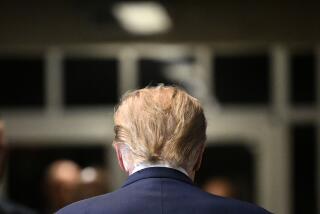Bring Him to Justice in the U.S.
- Share via
No one ever said it would be easy to bring the world’s most hated man to trial. Yet just when it seems possible that we might capture Osama bin Laden and other high-ranking members of his Al Qaeda network, President Bush has issued an order that effectively undercuts his promise to bring Bin Laden to justice.
Although we may have the constitutional power to try foreign combatants captured in a foreign land before military tribunals, we should not do so.
Justice by U.S. standards means a trial before 12 independent jurors who are answerable to the law and not to the president. Trial by military tribunal means that those who will decide the guilt or innocence of the defendants are answerable to their commander in chief.
It would not be easy to try Bin Laden in a federal court. The case could not be tried in New York or Washington, where virtually everyone knows a victim or feels like a victim. The jury would have to be anonymous, so as to protect them from recriminations. Lawyers and the judge would have to be protected by bodyguards.
Neither would there be any guarantee of a conviction, in a case where the media hype may mask an absence of specific evidence tying particular defendants to the criminal acts in question. All that would be required for the U.S. to be embarrassed would be a single holdout juror causing a mistrial. There are no guaranteed outcomes in a jury trial.
Two analogous cases come to mind. The first involves an earlier prosecution against Al Qaeda and some of its members for blowing up U.S. embassies. A lengthy and difficult trial resulted in a conviction, but the government did not get its way on the issue of sentencing. It asked the jury to impose the death penalty, and the jury declined to do so.
The second case was the conviction and execution of Timothy McVeigh, who before Sept. 11 was the most hated terrorist in U.S. history. Though his trial was far from perfect, it was better than the alternatives currently being proposed by the Bush administration.
There is no absolute guarantee that we could pull off a successful trial--if success is defined as not only fair but perceived to be fair. But by taking the case out of our courts and placing it before a military tribunal, President Bush has conceded failure without even trying. He has shown no faith in the ability of our well-tested legal system to endure the most daunting of challenges.
Part of our goal in organizing a worldwide campaign against terrorism is to persuade the world that we are on the right side. A secret military trial of Osama bin Laden would undercut that goal. Only those who now have faith in the good intentions of our government will credit such a trial. We will persuade none of the doubters; indeed, we will increase their doubts.
The criterion by which we judge our trials is not, of course, international acceptance. We must satisfy ourselves first. But how can we do so if our president has such little faith in an open trial, subject to worldwide visibility?
It might well be better, certainly easier, for our nation if Bin Laden and his henchmen ended up on the wrong side of a rocket during the heat of combat. They deserve no better. But if he were to walk out of his cave with a white flag, it would violate the rule of law--both peacetime and wartime law--to shoot him in cold blood.
At that point we would have no choice but to bring him to trial. The kind of trial we accord him would be remembered long after the military actions that prompted his surrender, if that were to occur.
Let’s try Bin Laden and his associates in a U.S. court, not because he deserves the rights accorded to defendants under our Constitution but because we deserve to see our legal system succeed even in the face of such great evil.
More to Read
Sign up for Essential California
The most important California stories and recommendations in your inbox every morning.
You may occasionally receive promotional content from the Los Angeles Times.













